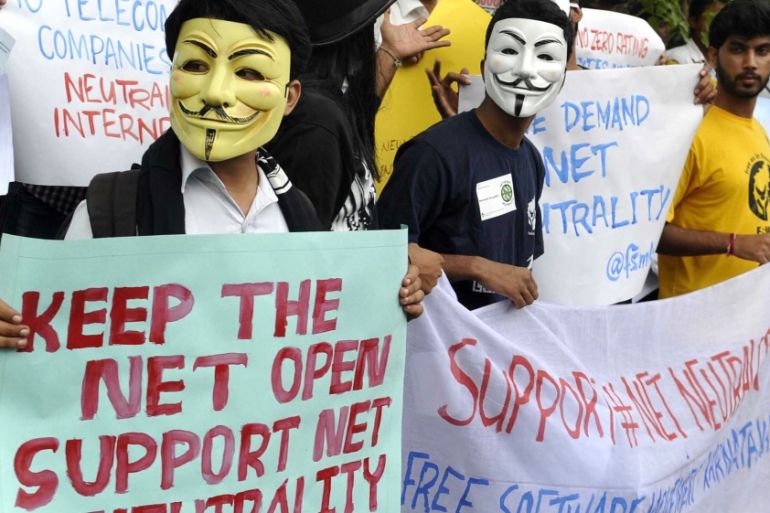Battle lines drawn in India’s internet debate
More than a million Indians join online campaign to try to keep the net free of rules seen as favouring telecom firms.

More than a million Indians have come together in an attempt to ensure that internet services remain free of government regulations seen as favouring big telecom companies, in the world’s third largest internet using country.
In one of the biggest online campaigns of recent times, Indians have given a verdict in favour of net neutrality after the Telecom Regulatory Authority of India (TRAI) sought peoples’ feedback last month.
Keep reading
list of 4 itemsHong Kong’s first monkey virus case – what do we know about the B virus?
Why will low birthrate in Europe trigger ‘Staggering social change’?
The Max Planck Society must end its unconditional support for Israel
TRAI sought to know whether any service or application provided online like messaging and voice services, e-commerce sites and apps should be regulated, and whether consumers should not just pay for data but also access to certain websites and services.
TRAI set a deadline of April 24 and, within days, was receiving 50 emails per minute in what activists called was the biggest such response to a government discussion paper in India.
Thank you to everyone who made this possible. Long way to go. With you we'll #SaveTheInternet. http://t.co/atNByduOJ2 pic.twitter.com/eJBwFJyA9x
— Internet Freedom Foundation (IFF) (@internetfreedom) April 23, 2015
Thirty-four year old Nikhil Pahwa, founder and editor of medianama.com, came together with more than 50 people of various backgrounds and from different parts of the country to launch an online campaign based on the idea of internet as a utility, a level playing field accessible to all, where its freedom is protected.
“There’s been a response by ordinary netizens against handing over the power to telecom companies. History has been made, never before has a government consultation received a million response,” Pahwa told Al Jazeera.
Through social media platforms such as Reddit India and Twitter more users pitched in to decode and simplify the 118 page long government discussion paper. Anonymous users helped the team to create FAQs for users.
Karthik Balakrishnan, a 22-year-old undergraduate engineering student from IT city of Bangalore, built a website which simplified the feedback process.
The process of submitting responses to the TRAI discussion document was made easily accessible with just a click of a button further promoted by an online video that went viral with more than 2.6 million views in just over 10 days.
“We are a group of individuals who have come together to fight for a common cause. We’ve paid for everything out of our own pockets. We all live in different cities, most of us have never met each other. Yet somehow we have run this completely remotely over the internet,” Balakrishnan told Al Jazeera.
More than 50 academicians of the country’s premier technology and science institutes also backed the movement for net neutrality saying it is essential to the idea of the internet.
“There is a potential that the internet might be split up into fast and slow lanes.There is a chance that data might be throttled, that consumers would have to pay more to access certain services compared to others,” Gursimran Khamba, co-founder of AIB, a comedy group that created the viral video, told Al Jazeera
According to the Internet and Mobile Association of India (IAMI), there are 302 million internet users in the country of which close to 180 million access the internet on their cellphones. The Indian e-commerce market according to some estimates will be close to $22 billion this year, the stakes as many point out are high.
“If you look at the consultation papers by TRAI, there seems to be a tendency towards regulating the sector. Eventually it will affect the startups because they don’t have money to pay the licensing fee and that will affect innovation and entrepreneurship in India,” Nilotpal Chakravarti, Associate Vice President of IAMI, told Al Jazeera.
For the Telecom companies the debate is about cost rationality and the threat of increasing competition from internet companies.
They insist that high cost of building networks and infrastructure together with services such as Whatsapp,Skype, Facebook and Viber eating into their messaging revenues, prices need to be justified by charging users for data.
On Friday, the influential Cellullar Operators Association of India (COAI), launched an initiative which it says will focus on providing access to internet to millions of unconnected Indians. The telecom companies say they are not asking for regulations on online services but are insisting on parity.
“Same Rules for Same Services-basically means that the regulations and rules applicable to the telecom service providers should be made applicable to any other service provider offering the same service, including Mobile voice, telephony services and IP Voice services,” Rajan S. Matthews, the director general of COAI told Al Jazeera.
Technology is disruptive; coping with rapid change only way out for telecom. Social media firms redefining user experience. #NetNeutrality
— Sanjay Jha (@JhaSanjay) April 23, 2015
India has the slowest internet speed in Asia Pacific after Indonesia with a speed of 2.0 mbps less than global average of 4.5 mbps.
The Indian government, which last year launched its Digital India campaign promised high speed internet in all rural areas, has said that the final decision does not rest with TRAI and is committed to providing internet to all.
The debate continues as campaigners have asked the government to stop telecom companies from violating net neutrality.